Das Vereinigte Königreich von Mitteleuropa
- Thread starter unmerged(81979)
- Start date
-
We have updated our Community Code of Conduct. Please read through the new rules for the forum that are an integral part of Paradox Interactive’s User Agreement.
You are using an out of date browser. It may not display this or other websites correctly.
You should upgrade or use an alternative browser.
You should upgrade or use an alternative browser.
So, what the heck happened in the game?
What mod?
ahhh I see. Well, nothing actually because I got the idea for this story playing a game not from an actual game. If anyone wants to make a mod based off this then great, or if there already is one even better haha
Does it matter?The story is the important part.
haha and Nikolai has a point here too. Hopefully I'll have an update by Thursday!
Sorry about the delay, folks, I want to make this next chapter a good coverage of the elections and therefore as explicative and detail-oriented as possible. Also, I am quite busy this weekend but will spend as much time as possible on this in the coming days 
Das Vereinigte Königreich von Mitteleuropa
Chapter Three
The arrival of Election Day brought forth much fanfare among the nations of the UKCE. Voter turnout was very high; between 74 and 80 percent for all nations. The makeup of each parliament different from nation to nation, such as the more left-leaning Czechs voting well over 50% socialist compared to the relatively conservative Croatians whose Communist Party scored less than 1% of the vote. Though election laws differed somewhat in each nation, all were unicameral parliamentary bodies elected by proportional voting. The results for the national elections are as follows:
1. Austria (250 Seats, 5% Threshold for Parties, *=In Coalition):
-*Social Democratic Party, 38%- 95 Seats (Soc.)
-Austrian People’s Party, 24%- 60 Seats (C-R)
-*Liberal Monarchist Party, 21%- 53 Seats (C-L)
-Empire Party, 11%- 27 Seats (F-R)
-Communist Party, 6%- 15 Seats (Com.)
-Result: Karl Renner retains Premiership in coalition with the left-leaning Liberal Monarchist Party led by pre-war chancellor and elder statesman, Otto Ender, as Deputy Chancellor.
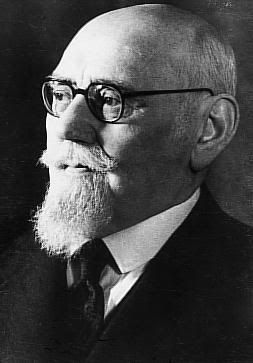
PM Karl Renner
2. Hungary (350 Seats, 5% Threshold for Parties, *=In Coalition)
-*Smallholder’s Party, 42%- 147 Seats (Agrarian)
-*Christian Democratic People’s Party, 39%- 137 Seats (C-R)
-Hungarian Social Christian Movement, 10%- 35 Seats (Soc.)
-Hungarian Socialist Worker’s Party, 9%- 31 Seats (Com.)
-Result: Ferenc Nagy wins a close election, though the second place party, the CDPP, is not ideologically far off. They form a coalition almost immediately as CDPP leader, the Bishop-turned-politician Jozsef Mindszenty.
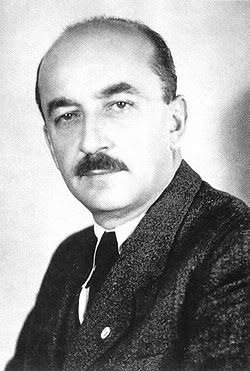
PM Ferenc Nagy
3. Czecholsovakia (250 Seats, 3% Threshold for Parties)
-Social Democratic Party, 54%- 135 Seats (Soc.)
-Young Czech Party, 29%- 73 Seats (C-R)
-Communist Party, 9%- 22 Seats (Com.)
-Slovak People’s Party, 8%- 20 Seats (Slovak Nationalist)
-Result: Benes’ Social Democratic Party won a landslide over their opponents and manage to secure a parliamentary majority unlike many of the other nations.
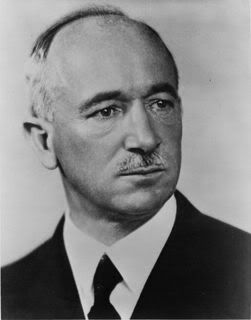
PM Edvard Benes
4. Slovenia (120 Seats, 5% Threshold for Parties, *=In Coalition)
-*Slovenian People’s Party, 40%- 48 Seats (Populist, C-L)
-Slovenian Nationalist Party, 22%- 27 Seats (F-R)
-Christian Democratic Party, 19%- 23 Seats (C-R)
-Communist Party, 7%- 8 Seats (Com.)
-*Slovenian Socialist Party, 7%- 8 Seats (Soc.)
-*Agrarian Farm Worker’s Party, 5%- 6 Seats (Agrarian, Soc.)
-Result: While Prime Minister Izidor Canker remains in power, it is a shaky coalition with only a 52% majority that holds power as PM Canker had to make deals with the two smallest Slovenian Parties in order to overcome a challenge by the Christian Democrats and Slovene Nationalists.
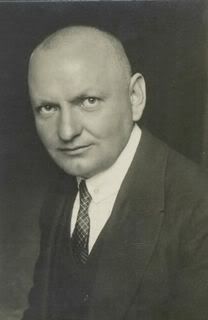
PM Izidor Cankar
5. Croatia (175 Seats, 10% Threshold for Parties)
-Croatian People’s Farm Party, 53%- 93 Seats (Agrarian, Soc.)
-Croatian Republican Party, 26%- 46 Seats (C-L, Anti-Monarchist)
-Christian Union Party, 21%- 36 Seats (C-R)
-Result: Vladko Macek retained power and with Croatia’s unusually high threshold for voting, a stable government under the leadership of his Croatian People’s Farm Party was to be had while other governments in Slovenia and Hungary had more tension in their governing.
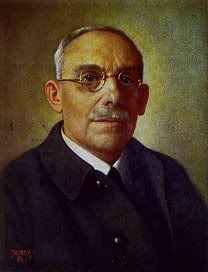
PM Vladko Macek
In each national election, the currently reigning prime minister was returned as head of the government. However, the stability of the said government was highly variable dependent on the state. The most stable were Croatia and Czechoslovakia whose ruling parties (both Socialist) made up more than half of the total seats in the parliaments. In the middle-ground was Austria whose Social Democratic Party and Liberal Monarchist Party made up a coalition of relatively like-minded MPs, with the only major outstanding issue between them was the implementation of certain social service programs that the SDP liked but the LMP were wary of due to expense issue. Hungary comes in as number four on the stability chart where the Smallholder’s Party and Christian Democratic People’s Party stood together in a coalition. They, like Austria, had similar ideas but the biggest key difference between them was the role of religion in the state. The CDPP, led by a Bishop of the Catholic Church, obviously wanted Catholicism and Catholic values to play a larger role in the running of the government while the Smallholder’s Party had no interest in turning Hungary into a model Catholic state. Plus, personal animosity between Bishop Mindszenty and PM Nagy helped very little as well.
Of the five nations, Slovenia was the least stable. The largest party which controlled 40% of the parliament, the Slovene People’s Party, had to make a deal with the two smallest parties (both Socialist, one more Agrarian than the other) in order to create a working government. Of the other two parties, the Slovene Nationalists simply wanted an independent Slovenia. Each nation (except Austria) had its own form of independence movement (with Czechoslovakia having two, one for the whole thing and one for Slovakia) but the only organized one happened to be in Slovenia. Their organization paid off when it was revealed by a somewhat shocked electoral commission that they had, in fact, won 22% of the vote and made up the second largest block in parliament. The leader of the Slovene Nationalists (who tended towards Communism) was Edvard Kocbek, a famous writer and resistance fighter through World War Two for Slovenia. Since his goal was only Slovene independence, the SPP found it hard to work with them so they were passed over for a spot in government. The other larger party in Slovenia, the Christian Democratic Party, held opposite views from that of the SPP in almost every area. That left the two smallest parties and the Communist Party, the latter of whom was passed over like in every other government to the great joy of Kaiser Otto.
The (supra)-national parliamentary elections for all 100 lower-house seats were on the same day as well and the results were somewhat surprising. For national parliament, no local parties could compete and instead cross-national structured parties would be able to compete only. In this way, people voted for the party and not necessarily a candidate. This was so that no nation could invest much interest over the whole process or other nations could be totally swallowed up in the process (like Slovenia). Due to the structurally and politically limited nature of the national government’s lower house, there were only two main parties competing. The Monarchist Alliance (led by favored a stronger defense, a more aggressive foreign policy (slightly favoring the West), a small and tightly controlled supranational government and somewhat of a more traditional stance of deference towards the Kaiser. Their opponents, the Social Democratic League, favored neutrality (slightly favoring the Soviets) in foreign affairs and a relaxed defense budget so that a more expansive national social system could be implemented at government expense. The election resulted as follows:
Monarchist Alliance: 56 seats (led by Archduke Karl Albrecht of Austria)
Social Democratic League: 44 seats (led by Antonin Zapotocky of Czechoslovakia)
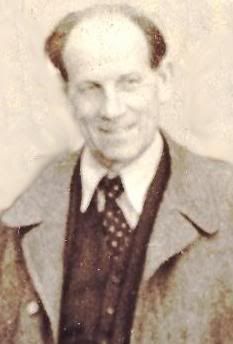
Antonin Zapotocky
Otto viewed the results of each election closely and was generally satisfied with the result. Though he wished he could ban the heathens in all the independence parties, he knew that to do so would bring about political turmoil and lead to an even worse scenario: potential takeover by the Communists. So, with due grace, Otto accepted the results of each election in turn by broadcast given in the early afternoon of July 4, 1945. In the same broadcast he announced two very important things. Firstly, the new Royal Governors were announced. And, to no one’s surprise, they were all Habsburgs. The Royal Governor of Hungary would be Otto’s cousin Archduke Joseph August, in Czechoslovakia it would be the aging Archduke Eugen Ferdinand, in Slovenia it would be Archduke Anton of the Tuscan line of the Habsburgs and finally in Croatia it would be his younger brother Archduke Felix once he got back from his trip to the United States. In the meantime, Archduke Anton would fulfill that role as well.
The second announcement Kaiser Otto made was to the make-up of the 25-member National Senate. With little surprise the entire chamber was filled with Habsburgs, members of the nobility and leaders of the Catholic Church.
What was surprising about the entire situation was the people’s reaction to it. Otto expected heavy criticism to come from the population of his Empire. However, though the criticism was provided by Communists in abundance, the largely war-weary populations in Central Europe were prepared to accept this arraignment as it appeared very stable rather than risk facing the greedy East and West alone. In his assessments, Otto realized that he couldn’t simply expect the people’s acceptance of his plans without substance to back them up. Though no Republican, Otto was not entirely an aloof aristocrat either. It would be his job to balance the needs of the people with the needs of the nation, and for now the best way to do it was with conservative members of his own family that he trusted. The Habsburgs were largely docile and humbled after the post-war and WWII experience, leaving the people enough power to satisfy both parties.
The state openings of each parliament were to be in late July. However, business on the international front preceded even this momentous event. Stalin, Churchill, Attlee and Truman were planning to meet in Potsdam starting only next week on July 17. The leaders of the free world extended the opportunity for Kaiser Otto and his Foreign Minister (The Archduke Karl Albrecht, who was Foreign Minister as well as Prime Minister of the UKCE National Parliament) to attend the conference as equals. Otto leapt at the chance and the duo departed for Berlin on July 12, 1945.
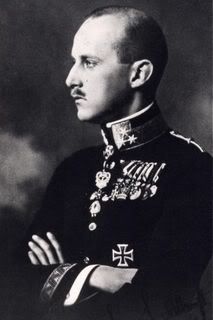
Archduke Karl Albrecht, PM and Foreign Minister of the UKCE
Chapter Three
The arrival of Election Day brought forth much fanfare among the nations of the UKCE. Voter turnout was very high; between 74 and 80 percent for all nations. The makeup of each parliament different from nation to nation, such as the more left-leaning Czechs voting well over 50% socialist compared to the relatively conservative Croatians whose Communist Party scored less than 1% of the vote. Though election laws differed somewhat in each nation, all were unicameral parliamentary bodies elected by proportional voting. The results for the national elections are as follows:
1. Austria (250 Seats, 5% Threshold for Parties, *=In Coalition):
-*Social Democratic Party, 38%- 95 Seats (Soc.)
-Austrian People’s Party, 24%- 60 Seats (C-R)
-*Liberal Monarchist Party, 21%- 53 Seats (C-L)
-Empire Party, 11%- 27 Seats (F-R)
-Communist Party, 6%- 15 Seats (Com.)
-Result: Karl Renner retains Premiership in coalition with the left-leaning Liberal Monarchist Party led by pre-war chancellor and elder statesman, Otto Ender, as Deputy Chancellor.

PM Karl Renner
2. Hungary (350 Seats, 5% Threshold for Parties, *=In Coalition)
-*Smallholder’s Party, 42%- 147 Seats (Agrarian)
-*Christian Democratic People’s Party, 39%- 137 Seats (C-R)
-Hungarian Social Christian Movement, 10%- 35 Seats (Soc.)
-Hungarian Socialist Worker’s Party, 9%- 31 Seats (Com.)
-Result: Ferenc Nagy wins a close election, though the second place party, the CDPP, is not ideologically far off. They form a coalition almost immediately as CDPP leader, the Bishop-turned-politician Jozsef Mindszenty.

PM Ferenc Nagy
3. Czecholsovakia (250 Seats, 3% Threshold for Parties)
-Social Democratic Party, 54%- 135 Seats (Soc.)
-Young Czech Party, 29%- 73 Seats (C-R)
-Communist Party, 9%- 22 Seats (Com.)
-Slovak People’s Party, 8%- 20 Seats (Slovak Nationalist)
-Result: Benes’ Social Democratic Party won a landslide over their opponents and manage to secure a parliamentary majority unlike many of the other nations.

PM Edvard Benes
4. Slovenia (120 Seats, 5% Threshold for Parties, *=In Coalition)
-*Slovenian People’s Party, 40%- 48 Seats (Populist, C-L)
-Slovenian Nationalist Party, 22%- 27 Seats (F-R)
-Christian Democratic Party, 19%- 23 Seats (C-R)
-Communist Party, 7%- 8 Seats (Com.)
-*Slovenian Socialist Party, 7%- 8 Seats (Soc.)
-*Agrarian Farm Worker’s Party, 5%- 6 Seats (Agrarian, Soc.)
-Result: While Prime Minister Izidor Canker remains in power, it is a shaky coalition with only a 52% majority that holds power as PM Canker had to make deals with the two smallest Slovenian Parties in order to overcome a challenge by the Christian Democrats and Slovene Nationalists.

PM Izidor Cankar
5. Croatia (175 Seats, 10% Threshold for Parties)
-Croatian People’s Farm Party, 53%- 93 Seats (Agrarian, Soc.)
-Croatian Republican Party, 26%- 46 Seats (C-L, Anti-Monarchist)
-Christian Union Party, 21%- 36 Seats (C-R)
-Result: Vladko Macek retained power and with Croatia’s unusually high threshold for voting, a stable government under the leadership of his Croatian People’s Farm Party was to be had while other governments in Slovenia and Hungary had more tension in their governing.

PM Vladko Macek
In each national election, the currently reigning prime minister was returned as head of the government. However, the stability of the said government was highly variable dependent on the state. The most stable were Croatia and Czechoslovakia whose ruling parties (both Socialist) made up more than half of the total seats in the parliaments. In the middle-ground was Austria whose Social Democratic Party and Liberal Monarchist Party made up a coalition of relatively like-minded MPs, with the only major outstanding issue between them was the implementation of certain social service programs that the SDP liked but the LMP were wary of due to expense issue. Hungary comes in as number four on the stability chart where the Smallholder’s Party and Christian Democratic People’s Party stood together in a coalition. They, like Austria, had similar ideas but the biggest key difference between them was the role of religion in the state. The CDPP, led by a Bishop of the Catholic Church, obviously wanted Catholicism and Catholic values to play a larger role in the running of the government while the Smallholder’s Party had no interest in turning Hungary into a model Catholic state. Plus, personal animosity between Bishop Mindszenty and PM Nagy helped very little as well.
Of the five nations, Slovenia was the least stable. The largest party which controlled 40% of the parliament, the Slovene People’s Party, had to make a deal with the two smallest parties (both Socialist, one more Agrarian than the other) in order to create a working government. Of the other two parties, the Slovene Nationalists simply wanted an independent Slovenia. Each nation (except Austria) had its own form of independence movement (with Czechoslovakia having two, one for the whole thing and one for Slovakia) but the only organized one happened to be in Slovenia. Their organization paid off when it was revealed by a somewhat shocked electoral commission that they had, in fact, won 22% of the vote and made up the second largest block in parliament. The leader of the Slovene Nationalists (who tended towards Communism) was Edvard Kocbek, a famous writer and resistance fighter through World War Two for Slovenia. Since his goal was only Slovene independence, the SPP found it hard to work with them so they were passed over for a spot in government. The other larger party in Slovenia, the Christian Democratic Party, held opposite views from that of the SPP in almost every area. That left the two smallest parties and the Communist Party, the latter of whom was passed over like in every other government to the great joy of Kaiser Otto.
The (supra)-national parliamentary elections for all 100 lower-house seats were on the same day as well and the results were somewhat surprising. For national parliament, no local parties could compete and instead cross-national structured parties would be able to compete only. In this way, people voted for the party and not necessarily a candidate. This was so that no nation could invest much interest over the whole process or other nations could be totally swallowed up in the process (like Slovenia). Due to the structurally and politically limited nature of the national government’s lower house, there were only two main parties competing. The Monarchist Alliance (led by favored a stronger defense, a more aggressive foreign policy (slightly favoring the West), a small and tightly controlled supranational government and somewhat of a more traditional stance of deference towards the Kaiser. Their opponents, the Social Democratic League, favored neutrality (slightly favoring the Soviets) in foreign affairs and a relaxed defense budget so that a more expansive national social system could be implemented at government expense. The election resulted as follows:
Monarchist Alliance: 56 seats (led by Archduke Karl Albrecht of Austria)
Social Democratic League: 44 seats (led by Antonin Zapotocky of Czechoslovakia)

Antonin Zapotocky
Otto viewed the results of each election closely and was generally satisfied with the result. Though he wished he could ban the heathens in all the independence parties, he knew that to do so would bring about political turmoil and lead to an even worse scenario: potential takeover by the Communists. So, with due grace, Otto accepted the results of each election in turn by broadcast given in the early afternoon of July 4, 1945. In the same broadcast he announced two very important things. Firstly, the new Royal Governors were announced. And, to no one’s surprise, they were all Habsburgs. The Royal Governor of Hungary would be Otto’s cousin Archduke Joseph August, in Czechoslovakia it would be the aging Archduke Eugen Ferdinand, in Slovenia it would be Archduke Anton of the Tuscan line of the Habsburgs and finally in Croatia it would be his younger brother Archduke Felix once he got back from his trip to the United States. In the meantime, Archduke Anton would fulfill that role as well.
The second announcement Kaiser Otto made was to the make-up of the 25-member National Senate. With little surprise the entire chamber was filled with Habsburgs, members of the nobility and leaders of the Catholic Church.
What was surprising about the entire situation was the people’s reaction to it. Otto expected heavy criticism to come from the population of his Empire. However, though the criticism was provided by Communists in abundance, the largely war-weary populations in Central Europe were prepared to accept this arraignment as it appeared very stable rather than risk facing the greedy East and West alone. In his assessments, Otto realized that he couldn’t simply expect the people’s acceptance of his plans without substance to back them up. Though no Republican, Otto was not entirely an aloof aristocrat either. It would be his job to balance the needs of the people with the needs of the nation, and for now the best way to do it was with conservative members of his own family that he trusted. The Habsburgs were largely docile and humbled after the post-war and WWII experience, leaving the people enough power to satisfy both parties.
The state openings of each parliament were to be in late July. However, business on the international front preceded even this momentous event. Stalin, Churchill, Attlee and Truman were planning to meet in Potsdam starting only next week on July 17. The leaders of the free world extended the opportunity for Kaiser Otto and his Foreign Minister (The Archduke Karl Albrecht, who was Foreign Minister as well as Prime Minister of the UKCE National Parliament) to attend the conference as equals. Otto leapt at the chance and the duo departed for Berlin on July 12, 1945.

Archduke Karl Albrecht, PM and Foreign Minister of the UKCE
Last edited:
Enewald's right. They voted the Monarchists into the supra-national parliament when they clearly should have voted in the moderate Socailists. Silly Central Europeans. 
They voted awry.
Damning themselves.
Ahhh yes I see
Enewald's right. They voted the Monarchists into the supra-national parliament when they clearly should have voted in the moderate Socailists. Silly Central Europeans.
Haha well hey, at least the Monarchists have shiny titles
Enewald's right. They voted the Monarchists into the supra-national parliament when they clearly should have voted in the moderate Socailists.
Anyone would think the events of the first half of the 1940s had given them reason to be wary of ideological political movements.
Do the monarchists have any agenda other than muddling through (with a slightly bigger army) and awarding each other nice titles?
Great idea for an AAR. I have no idea how it will turn out.
Anyone would think the events of the first half of the 1940s had given them reason to be wary of ideological political movements.
Do the monarchists have any agenda other than muddling through (with a slightly bigger army) and awarding each other nice titles?
Great idea for an AAR. I have no idea how it will turn out.
Other than titles, they have largely assumed the position of a traditional conservative party who want to as they see it straddle the line between the west and east. And thank you!
PS Sorry for the lack of updation life's been hectic. I have sometime today/this weekend and will be writing one soon!!
I have decided to resurrect this. I am not sure quite when or how, but I would very much like to. Stay tuned!
Yay!
Thanks for your support! It is really appreciated!!!
Das Vereinigte Königreich von Mitteleuropa
Chapter Four
Otto I looked out of the window of the airplane transporting him and Archduke Karl Albrecht to Potsdam as it began its descent. The destruction below was immense, and in disgust he turned away. Nudging the Archduke, who had fallen asleep, Otto said, “Karl, do you think we will come out of Potsdam any better than we have entered it?” Archduke Karl coughed lightly, saying, “We enter Potsdam with nothing but a newborn Empire built on rusted legs and tired masses. If we leave with anything more than hope, we shall be more victorious than is calculable.”
With such warming sentiments, the two most powerful men in Central Europe landed in good weather with a small crowd around the airport filled with curious onlookers from the local area and American, British and Soviet soldiers either on leave or in the honor guard. As Emperor Otto and Archduke Karl deplaned, they were met with polite cheering, a band playing Gott erhalte, Gott beschutze, and Prime Minister Winston Churchill. As the wizened father of British victory greeted the two Habsburgs in gravelly eloquence, he beckoned them jovially to the awaiting car, “Come, Your Majesty, Your Highness, we have a great work to embark on.”
…
The conference at Potsdam, lasting from July 16 to August 2, 1945 was one of the most important conferences, truly, in human history. It saw President Truman of the United States, Premier Joseph Stalin of the Soviet Union, PM Winston Churcill (and later PM Clement Attlee) and Emperor Otto I of the UKCE sit down together and discuss the final details of a Europe without Hitler.

Potsdam conference members, excluding the Emperor and Archduke. l-r, PM Winston Churchill, President Harry Truman, Premier Josef Stalin
While the UKCE was initially promised equal footing at the conference, it quickly became clear that the old power structure of the tripartite USA-UK-USSR allies would be performing most of the discussion. Making the best of the situation, Emperor Otto and Archduke Karl began to form friendships with the different members of the conference and influence the goings-on informally. The biggest way in which Emperor Otto, and even more so Archduke Karl, affected the conference is the official reconstitution of Yugoslavia without Croatia and Slovenia. Archduke Karl argued successfully for the continuation of the Yugoslav monarchy under the young Peter II. Initially the Soviets balked and the Americans worried about the stability that Yugoslavia would enjoy under a not-yet 22 year old monarch. However, Archduke Karl convinced Churchill (and later Attlee) to support the UKCE position of a royal Yugoslavia. The British brought the Americans over to the Royal Yugoslav position and eventually the Soviets relented.
Having a firmly Imperial Yugoslavia would benefit the UKCE greatly in two distinct ways. Firstly, the re-imposition of monarchy would increase the legitimacy of the UKCE own new government; a monarchy with historical but greatly altered precedents. Secondly, the young Peter II was still young enough to be diplomatically influenced. During their respective exiles in the United States and the Untied Kingdom, Otto and Peter had struck up a correspondence and one may even go as far to say they had become friends. This would provide the UKCE with a staunch ally to the south who would be more amenable to what Vienna had to say than any other country.
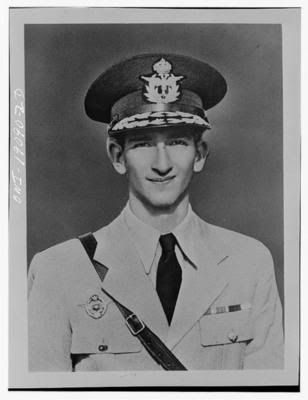
Peter II of Yugoslavia
Emperor Otto and Archduke Karl were heavily involved in the German repatriation discussions surrounding the expulsion of ethnic Germans from Czechoslovakia and Hungary. In a compromise, as Otto recognized that they were no more ‘German’ per se than ‘Austrian’ in character, Otto offered to house a certain number of the displaced Germans if they so wished to go to Austria and take up permanent residency. The allies appreciated this generosity and promised financial support equivalent to $62 per person moved into Austria as part of the program. Setting the limit at 350,000, the UKCE would receive a cheque for $21,700,000 dollars.
The benefits of that financial stimulant are inestimable, as Otto and Karl realized that their government finances needed stabilizing immediately. Unfortunately for the ethnic Germans moving to Austria, they would receive little of this money. However, most curiously, it came into question whether or not Otto and Karl had the authority to do this as this was seemingly a local issue that the Austrian parliament should have voice on. However, Archduke Karl argued that since it was moving between various nations of the UKCE it was only the Supranational Parliament that had authority to do so. This would flair up into a major crisis shortly down the road. Most people were simply happy not to be shot at anymore.
When the conference closed on August 2, 1945, Emperor Otto and Archduke Karl signed the document gladly, feeling they had done well for the UKCE. Even though their proposal to divide German occupation into five zones, with a UKCE one in Bavaria, fell through, they felt they could return to Vienna triumphant in an early diplomatic success.
Chapter Four
Otto I looked out of the window of the airplane transporting him and Archduke Karl Albrecht to Potsdam as it began its descent. The destruction below was immense, and in disgust he turned away. Nudging the Archduke, who had fallen asleep, Otto said, “Karl, do you think we will come out of Potsdam any better than we have entered it?” Archduke Karl coughed lightly, saying, “We enter Potsdam with nothing but a newborn Empire built on rusted legs and tired masses. If we leave with anything more than hope, we shall be more victorious than is calculable.”
With such warming sentiments, the two most powerful men in Central Europe landed in good weather with a small crowd around the airport filled with curious onlookers from the local area and American, British and Soviet soldiers either on leave or in the honor guard. As Emperor Otto and Archduke Karl deplaned, they were met with polite cheering, a band playing Gott erhalte, Gott beschutze, and Prime Minister Winston Churchill. As the wizened father of British victory greeted the two Habsburgs in gravelly eloquence, he beckoned them jovially to the awaiting car, “Come, Your Majesty, Your Highness, we have a great work to embark on.”
…
The conference at Potsdam, lasting from July 16 to August 2, 1945 was one of the most important conferences, truly, in human history. It saw President Truman of the United States, Premier Joseph Stalin of the Soviet Union, PM Winston Churcill (and later PM Clement Attlee) and Emperor Otto I of the UKCE sit down together and discuss the final details of a Europe without Hitler.

Potsdam conference members, excluding the Emperor and Archduke. l-r, PM Winston Churchill, President Harry Truman, Premier Josef Stalin
While the UKCE was initially promised equal footing at the conference, it quickly became clear that the old power structure of the tripartite USA-UK-USSR allies would be performing most of the discussion. Making the best of the situation, Emperor Otto and Archduke Karl began to form friendships with the different members of the conference and influence the goings-on informally. The biggest way in which Emperor Otto, and even more so Archduke Karl, affected the conference is the official reconstitution of Yugoslavia without Croatia and Slovenia. Archduke Karl argued successfully for the continuation of the Yugoslav monarchy under the young Peter II. Initially the Soviets balked and the Americans worried about the stability that Yugoslavia would enjoy under a not-yet 22 year old monarch. However, Archduke Karl convinced Churchill (and later Attlee) to support the UKCE position of a royal Yugoslavia. The British brought the Americans over to the Royal Yugoslav position and eventually the Soviets relented.
Having a firmly Imperial Yugoslavia would benefit the UKCE greatly in two distinct ways. Firstly, the re-imposition of monarchy would increase the legitimacy of the UKCE own new government; a monarchy with historical but greatly altered precedents. Secondly, the young Peter II was still young enough to be diplomatically influenced. During their respective exiles in the United States and the Untied Kingdom, Otto and Peter had struck up a correspondence and one may even go as far to say they had become friends. This would provide the UKCE with a staunch ally to the south who would be more amenable to what Vienna had to say than any other country.

Peter II of Yugoslavia
Emperor Otto and Archduke Karl were heavily involved in the German repatriation discussions surrounding the expulsion of ethnic Germans from Czechoslovakia and Hungary. In a compromise, as Otto recognized that they were no more ‘German’ per se than ‘Austrian’ in character, Otto offered to house a certain number of the displaced Germans if they so wished to go to Austria and take up permanent residency. The allies appreciated this generosity and promised financial support equivalent to $62 per person moved into Austria as part of the program. Setting the limit at 350,000, the UKCE would receive a cheque for $21,700,000 dollars.
The benefits of that financial stimulant are inestimable, as Otto and Karl realized that their government finances needed stabilizing immediately. Unfortunately for the ethnic Germans moving to Austria, they would receive little of this money. However, most curiously, it came into question whether or not Otto and Karl had the authority to do this as this was seemingly a local issue that the Austrian parliament should have voice on. However, Archduke Karl argued that since it was moving between various nations of the UKCE it was only the Supranational Parliament that had authority to do so. This would flair up into a major crisis shortly down the road. Most people were simply happy not to be shot at anymore.
When the conference closed on August 2, 1945, Emperor Otto and Archduke Karl signed the document gladly, feeling they had done well for the UKCE. Even though their proposal to divide German occupation into five zones, with a UKCE one in Bavaria, fell through, they felt they could return to Vienna triumphant in an early diplomatic success.
I think so too. It was nice of them to invite the UKCE, so just being there is victory enough. Now, with this support, universal legitimacy is not far behind! Thanks for reading, Nikolai!
Das Vereinigte Königreich von Mitteleuropa
Chapter Five
Archduke Felix sat with his brother Emperor Otto in the observation gallery of the Supranational Parliament in Vienna and watched as the MPs debated the entry of the United Kingdom of Central Europe into the United Nations. Archduke Felix had arrived in San Francisco three days before the charter was signed and was able to affix his signature (simply ‘Felix’) to the document acknowledging UKCE participation. Now, it had to be approved by the Supranational Parliament.

Signing of the UN Charter
Happily, with the relief of the war being over still tangible in the air, nothing but praise was heaped on the idea of the UN and it passed by a 97-3 vote. The approved bill was taken to the neighboring Senate as the crowd above switched galleries to observe the action, and lower house delegates crammed into the back of the upper chamber to observe. After listening to the lone dissenting member ramble on about infringing on the rights of nations, the bill was passed by a 24-1 vote. As the bill left the floor, the President of the Senate, the Archduke Maximilian Eugen personally carried the bill into the gallery, where Otto removed a pen from his vest pocket and signed the bill, giving his Royal Assent to the Charter of the United Nations. As he held the pen aloft, the gathered crowd cheered. Otto stood, and the few seated delegates stood as the room fell silent. Otto simply said, “Frieden und Einheit!”* as the room erupted in cheers again.
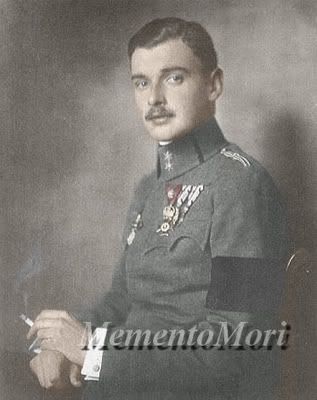
Archduke Maximilian Eugen, from a WWI-era portrait. Now, aged 50, he is the President of the Senate of the UKCE
With the approval of the United Nations’ charter completed, the last thing remained for the upper and lower house to do was confirm the 29-year-old Felix as the new official representative of the UKCE to the UN. The two delegates who travelled with Archduke Felix to San Francisco, Rudolf Beran, who was one of the two other delegates to San Francisco with Archduke Felix, was approved as adjunct representative. With Archduke Felix’s appointment to the United Nations, Emperor Otto took his Royal Governorship of Croatia and gave it to Archduke Hubert Salvator, the then Minister of Titles and Nobility.
Shortly after the United Nations vote, word spread to Vienna of the dropping of atomic weapons on Hiroshima and Nagasaki and the eventual surrender of Japan these brought about on August 14, 1945. In celebration, Emperor Otto sent President Truman a telegram of congratulations and donated an 18th-century portrait of Benjamin Franklin housed in the Habsburg collection to the American embassy in Vienna. The then current acting ambassador, General Mark W. Clark, graciously accepted the gift in a gala ball held in the embassy.

Gen. Mark W. Clark, acting ambassador to the UKCE
Despite the warm feelings engendered from the entrance into the United Nations, the formal ending of World War Two, late August saw a decisively nasty turn in the political climate. After great but largely lethargic debate, the Supranational Parliament approved the UKCE’s agreement in Potsdam to allow for German migration in exchange for $21.7 million. Now, the bill was passed down to the Austrian parliament for approval as it would affect Austria most of all.
The Austrian parliament erupted in a firestorm of criticism. PM Renner supported the act, as he knew the $21.7 million would be an incalculably valuable asset in the rebuilding of Austria. However, the aging Prime Minister had to summon all the forces of his available influence and call in favors from many other delegates to support the bill. A peaceful protest in Vienna was dispersed without injury by the newly reformed Vienna police. Another protest in Lienz in the Tyrol was more violent, as it was to their area of Austria where the new immigrants would largely be sent.
Finally, after a party-line vote with some defections, the bill passed the Austrian Parliament 127-104 with 19 abstentions. Otto gave his Royal Assent the next day even as protestors still filled the streets in Lienz. Keeping their promise, the Western Allies (mostly the United States), sent a cheque for $21.7 million dollars to the Austrian Government as the first of the 350,000 streamed across the border from Czechoslovakia and Hungary into Austria. After eleven days, the total was reached as the borders were closed again to the free movement of these ethnic Germans. Now, they were instead sent around to Germany proper. In the chaos of those eleven days, it is actually estimated that nearly 500,000 managed to immigrate into Austria. Spending $3.2 million of the ‘American’ funds, the Austrian government bought up plots of largely unfertile or vacant land at very low prices and resettled most of the new immigrants onto that land. The rest were left to fend for themselves as Austria pocketed the other $18.2 million.
An unseen influence, at least unseen to the public, was the presence of Emperor Otto during the great immigrant debates. Otto took advantage of his position of influence and met with many wavering Austrian MPs to get the immigrant bill to pass. This informal but impactful influence would only grow overtime as the young Emperor matured into a skilled and effective politician-cum-monarch.
Chapter Five
Archduke Felix sat with his brother Emperor Otto in the observation gallery of the Supranational Parliament in Vienna and watched as the MPs debated the entry of the United Kingdom of Central Europe into the United Nations. Archduke Felix had arrived in San Francisco three days before the charter was signed and was able to affix his signature (simply ‘Felix’) to the document acknowledging UKCE participation. Now, it had to be approved by the Supranational Parliament.

Signing of the UN Charter
Happily, with the relief of the war being over still tangible in the air, nothing but praise was heaped on the idea of the UN and it passed by a 97-3 vote. The approved bill was taken to the neighboring Senate as the crowd above switched galleries to observe the action, and lower house delegates crammed into the back of the upper chamber to observe. After listening to the lone dissenting member ramble on about infringing on the rights of nations, the bill was passed by a 24-1 vote. As the bill left the floor, the President of the Senate, the Archduke Maximilian Eugen personally carried the bill into the gallery, where Otto removed a pen from his vest pocket and signed the bill, giving his Royal Assent to the Charter of the United Nations. As he held the pen aloft, the gathered crowd cheered. Otto stood, and the few seated delegates stood as the room fell silent. Otto simply said, “Frieden und Einheit!”* as the room erupted in cheers again.

Archduke Maximilian Eugen, from a WWI-era portrait. Now, aged 50, he is the President of the Senate of the UKCE
With the approval of the United Nations’ charter completed, the last thing remained for the upper and lower house to do was confirm the 29-year-old Felix as the new official representative of the UKCE to the UN. The two delegates who travelled with Archduke Felix to San Francisco, Rudolf Beran, who was one of the two other delegates to San Francisco with Archduke Felix, was approved as adjunct representative. With Archduke Felix’s appointment to the United Nations, Emperor Otto took his Royal Governorship of Croatia and gave it to Archduke Hubert Salvator, the then Minister of Titles and Nobility.
Shortly after the United Nations vote, word spread to Vienna of the dropping of atomic weapons on Hiroshima and Nagasaki and the eventual surrender of Japan these brought about on August 14, 1945. In celebration, Emperor Otto sent President Truman a telegram of congratulations and donated an 18th-century portrait of Benjamin Franklin housed in the Habsburg collection to the American embassy in Vienna. The then current acting ambassador, General Mark W. Clark, graciously accepted the gift in a gala ball held in the embassy.

Gen. Mark W. Clark, acting ambassador to the UKCE
Despite the warm feelings engendered from the entrance into the United Nations, the formal ending of World War Two, late August saw a decisively nasty turn in the political climate. After great but largely lethargic debate, the Supranational Parliament approved the UKCE’s agreement in Potsdam to allow for German migration in exchange for $21.7 million. Now, the bill was passed down to the Austrian parliament for approval as it would affect Austria most of all.
The Austrian parliament erupted in a firestorm of criticism. PM Renner supported the act, as he knew the $21.7 million would be an incalculably valuable asset in the rebuilding of Austria. However, the aging Prime Minister had to summon all the forces of his available influence and call in favors from many other delegates to support the bill. A peaceful protest in Vienna was dispersed without injury by the newly reformed Vienna police. Another protest in Lienz in the Tyrol was more violent, as it was to their area of Austria where the new immigrants would largely be sent.
Finally, after a party-line vote with some defections, the bill passed the Austrian Parliament 127-104 with 19 abstentions. Otto gave his Royal Assent the next day even as protestors still filled the streets in Lienz. Keeping their promise, the Western Allies (mostly the United States), sent a cheque for $21.7 million dollars to the Austrian Government as the first of the 350,000 streamed across the border from Czechoslovakia and Hungary into Austria. After eleven days, the total was reached as the borders were closed again to the free movement of these ethnic Germans. Now, they were instead sent around to Germany proper. In the chaos of those eleven days, it is actually estimated that nearly 500,000 managed to immigrate into Austria. Spending $3.2 million of the ‘American’ funds, the Austrian government bought up plots of largely unfertile or vacant land at very low prices and resettled most of the new immigrants onto that land. The rest were left to fend for themselves as Austria pocketed the other $18.2 million.
An unseen influence, at least unseen to the public, was the presence of Emperor Otto during the great immigrant debates. Otto took advantage of his position of influence and met with many wavering Austrian MPs to get the immigrant bill to pass. This informal but impactful influence would only grow overtime as the young Emperor matured into a skilled and effective politician-cum-monarch.
*Peace and Unity

